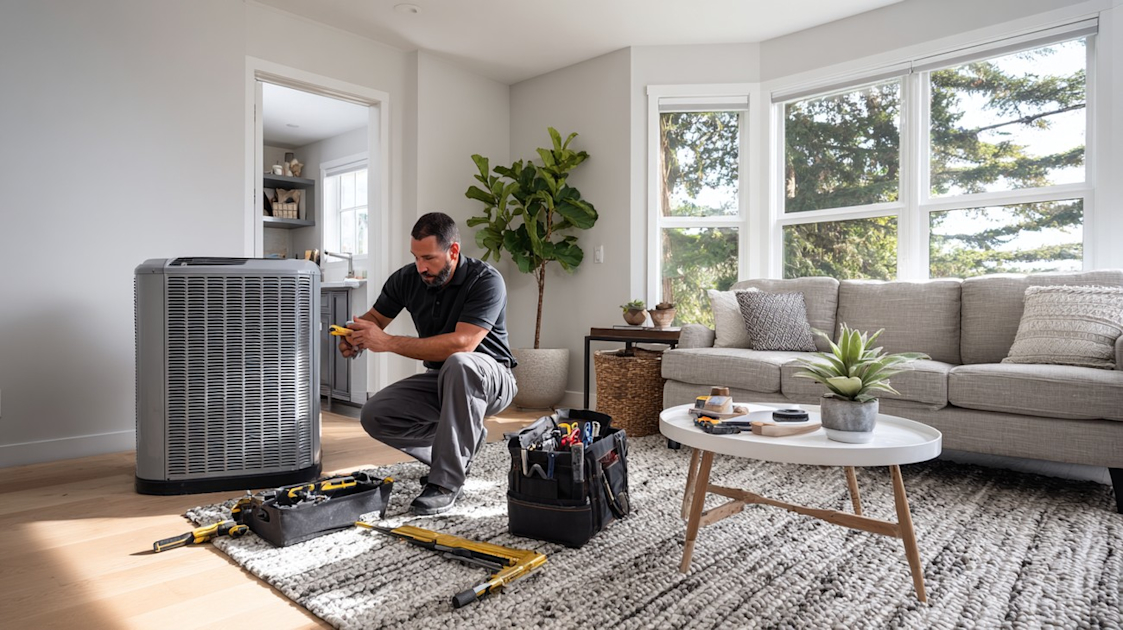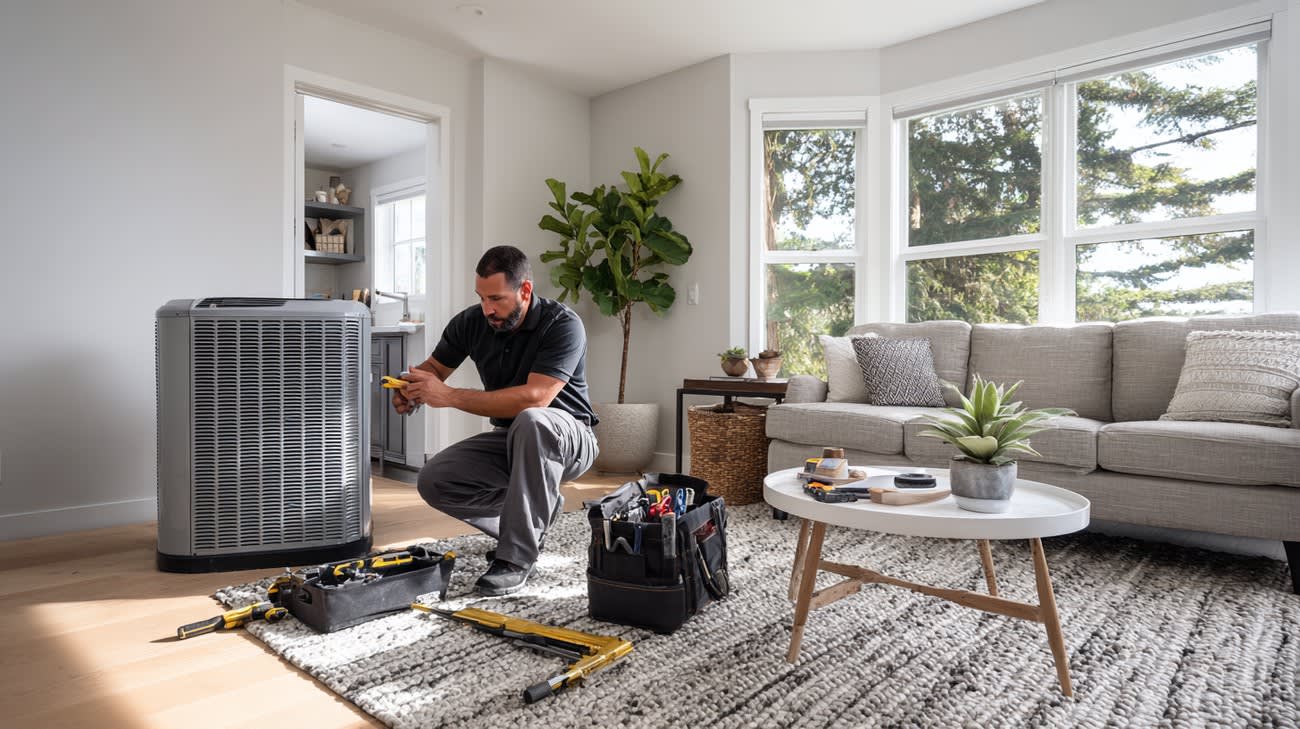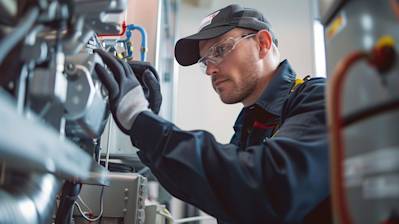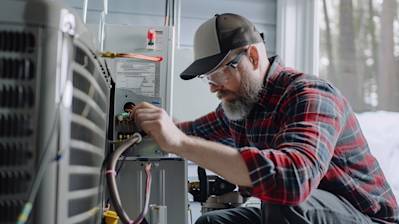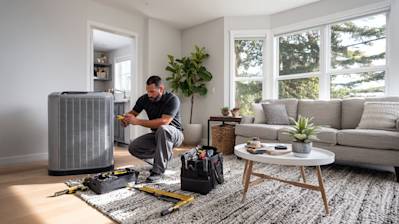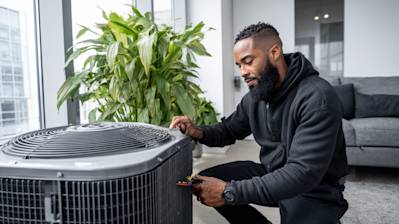In the heart of summer, nothing feels better than the crisp, refreshing breeze of an air conditioning system. It's a sanctuary from the searing outdoor heat. But what happens when your AC system decides to take an unscheduled break? An AC emergency repair situation ensues, requiring immediate attention to bring back that comforting coolness to your home. Let's delve deeply into understanding AC emergency repairs, knowing the signs, and how to handle such crises effectively.
Recognizing AC Emergency Signs
An air conditioning system seldom ceases operation without showing signs of distress. Recognizing these signs early can save you from unbearable discomfort and potentially reduce repair costs.
- Strange Noises: The typical sound of a running AC is a low hum. If you suddenly hear grinding, squealing, or banging noises, something is amiss.
- Unusual Odors: Musty or burnt smells might indicate mold in the ductwork or electrical issues.
- Warm Air: An AC that dispenses warm instead of cold air needs immediate evaluation.
- High Humidity: If your AC isn't reducing humidity levels, it’s time to check for malfunctions.
- Frequent Cycles: While cycling on and off is normal, constant cycling isn't. It can indicate various issues, from thermostat problems to short-circuiting.
Causes of AC Emergencies
Understanding what prompts sudden AC failures can equip you with the knowledge to prevent them.
Electrical Issues
An air conditioning system involves complex electrical circuits. Problems like short-circuiting, blown fuses, or wiring defects can quickly halt operations.
Refrigerant Leaks
Refrigerant is crucial for your AC to cool the air. A leak not only compromises efficiency but can also damage the compressor.
Frozen Evaporator Coils
If airflow is restricted or the refrigerant level is low, evaporator coils may freeze. This issue often presents itself with excessive condensation and poor cooling efficiency.
Faulty Thermostat
A malfunctioning thermostat can disrupt the unit's cooling cycle, causing it to work improperly or not at all.
Quick Actions During AC Emergencies
When your air conditioning fails, acting swiftly can prevent further damage and restore comfort quickly.
- Turn Off the Unit: Switching off the AC prevents further damage and potential safety hazards.
- Check the Thermostat Settings: Ensure it's set to 'cool' and the temperature is lower than the room's ambient temperature.
- Inspect the Power Supply: Look for blown fuses or tripped circuit breakers.
- Examine Air Filters: A clogged filter can lead to multiple issues, from freezing coils to poor airflow.
- Contact a Professional: If DIY checks don't resolve the problem, it's time to call an expert.
Benefits of Professional AC Emergency Repair
You might be tempted to try DIY fixes, but professional AC emergency repair offers several advantages:
- Expert Diagnosis: Professionals have the experience to quickly identify and fix issues accurately.
- Proper Tools and Equipment: They come equipped with specialized tools that ensure the job is done right.
- Safety and Efficiency: Handling AC repairs involve risks, including electrical hazards. Professionals ensure repairs are performed safely and efficiently.
- Peace of Mind: Knowing a qualified technician has repaired your unit provides assurance and comfort.
Preventive Measures
While emergencies can arise, regular maintenance can minimize the risk of sudden failures.
Schedule Routine Maintenance
Regular inspections by HVAC experts can identify potential problems early. This proactive approach allows you to address issues before they escalate into emergencies.
Replace Air Filters Regularly
Filters should be replaced every 1-3 months, depending on usage and the type of filter. This simple step promotes optimal airflow and cooling efficiency.
Keep Surrounding Areas Clean
Ensure the space around your outdoor unit is free from debris, including leaves, dirt, and grass clippings. Clean surroundings enhance airflow, improving system performance.
Choosing the Right Emergency Repair Service
In an emergency, selecting the right repair service is crucial for quick and efficient fixes.
Check for Licensing and Certification
Ensure that the repair company is licensed and certified. Qualified professionals are more reliable and proficient.
Response Time is Crucial
Choose a company that offers rapid response times and is available 24/7. This availability ensures that you won't be left sweltering in the heat for long periods.
Customer Reviews Matter
Word of mouth and online reviews provide insights into a company's reliability and the quality of its services.
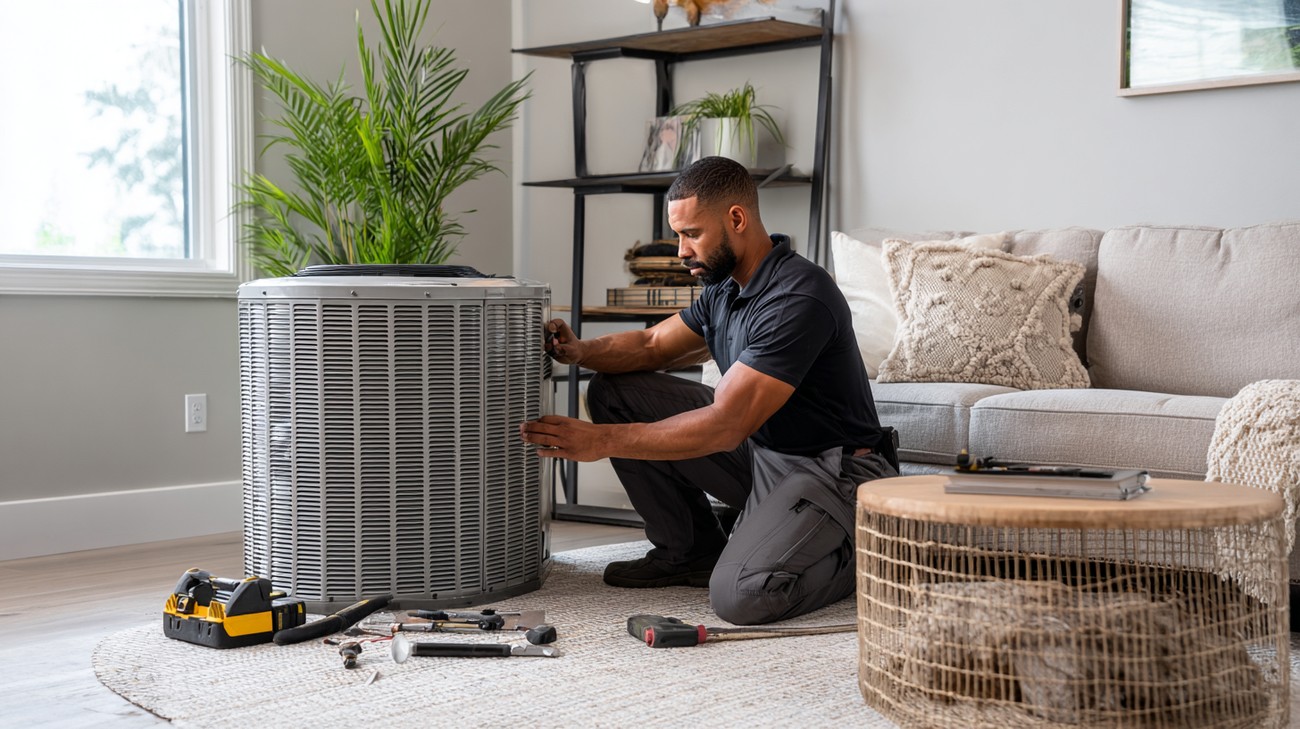
Frequently Asked Questions about Ac Emergency Repair
What constitutes an emergency when it comes to air conditioning repair?
An air conditioning issue becomes an emergency when it poses a risk to health, safety, or significant property damage. For instance, if your AC system leaks refrigerant, it can be hazardous to your health and the environment. Similarly, sparking wires or a complete system failure during extreme temperatures can be considered emergencies. In these situations, it's crucial to seek prompt AC emergency repair services.
Can I perform ac emergency repair myself, or should I hire a professional?
While some minor issues might seem manageable, it’s generally inadvisable to attempt AC emergency repair on your own. Air conditioning systems are complex, and incorrect repairs can lead to further damage or safety hazards. Hiring a licensed professional ensures the problem is accurately diagnosed and efficiently resolved, reducing the risk of additional repair needs in the future.
What should I do while waiting for ac emergency repair services to arrive?
While waiting for AC emergency repair services, there are steps you can take to minimize discomfort and potential damage. Turn off the system to prevent additional issues. Open windows and use fans to circulate air. If there’s a refrigerant leak, vacate the area and ensure the space is well-ventilated. Keeping calm and preparing for the technician’s visit can expedite the repair process once they arrive.
How fast can I expect a technician to arrive for an ac emergency repair?
Response times for AC emergency repair can vary depending on the service provider and the time of day you call. Many companies offer 24/7 services and strive to dispatch a technician as quickly as possible. Generally, a technician can arrive within a few hours. In off-hours or busy seasons, it might take slightly longer, but reputable companies prioritize emergencies to restore your system swiftly.
Is ac emergency repair more expensive than regular repair services?
AC emergency repair typically costs more than regular services due to the need for immediate attention and potential overtime work by technicians. The exact cost can vary based on the severity of the issue, required parts, and the service provider's pricing structure. Always inquire about fees and rates when contacting the repair service, so you're prepared for any additional costs associated with emergency repairs.
What are common issues that lead to the need for ac emergency repair?
Some common issues leading to AC emergency repair include refrigerant leaks, electrical failures, broken compressors, and clogged condensate drains. These problems can cause your system to operate inefficiently or stop working altogether. Quick identification and action can mitigate further damage and restore your cooling system to optimal condition.
How can routine maintenance prevent the need for ac emergency repair?
Routine maintenance is integral in preventing the need for AC emergency repair. Regular check-ups and servicing ensure your system's components are clean and functioning correctly, which helps in spotting potential problems before they escalate. Scheduling regular maintenance and cleaning air filters, checking refrigerant levels, and inspecting electrical components enhances efficiency and reduces the risk of sudden failures requiring emergency repair.
Are all ac emergency repair needs covered under warranty?
Warranty coverage for AC emergency repair depends on your specific warranty agreement. Typically, warranties cover costs related to defective parts or manufacturing faults but may not include issues arising from neglect, such as lack of maintenance. It’s essential to review your warranty's terms and conditions and consult with your service provider to understand which repairs are covered, especially in an emergency.
What should I look for in a good ac emergency repair service?
When selecting an AC emergency repair service, consider their availability, response times, expertise, and customer reviews. A good service provider offers 24/7 availability, skilled technicians with certification, transparent pricing, and a track record of prompt, effective repairs. Recommendations from friends or online trusted reviews can also guide you in choosing a reliable repair service.
Can regular ac repair services handle emergencies, or do I need specialized emergency services?
While many regular AC repair services can handle emergencies, it’s beneficial to choose a provider that specifically advertises emergency repair capabilities. These services are equipped to deal with urgent situations and usually offer faster response times. Specialized emergency services often have technicians on call around the clock to address critical issues promptly, ensuring your system is restored as soon as possible.

Troubleshooting Guide for AC Emergency Repair
Your air conditioning system is your best friend during the sizzling summer months. When it stops working, it's definitely an emergency! But don't panic, this troubleshooting guide will help you address some common AC problems. Let’s dive in.
Problem 1: AC Not Turning On
Symptoms:
- The AC unit does not start.
- No cold air is being produced.
Likely Causes:
- Tripped circuit breaker.
- Faulty thermostat.
Step-by-step Fixes:
- Check the Circuit Breaker: Locate your home's breaker box and see if the AC switch has flipped. Reset it if necessary.
- Inspect the Thermostat: Ensure it's set to "cool" and the temperature is lower than the current room temp.
- If these don't work, call a professional to inspect wiring.
When to Call a Professional: If resetting the breaker and checking the thermostat don't resolve the issue.
Prevention Tip: Regularly check your breaker box and test your thermostat.
Problem 2: Poor Airflow
Symptoms:
- Weak or no airflow from vents.
Likely Causes:
- Clogged air filters.
- Blocked ducts.
Step-by-step Fixes:
- Replace or Clean Air Filters: Dirty air filters restrict airflow. Check and replace them every 1-3 months.
- Inspect Ducts: Ensure there’s nothing blocking the pathways like furniture or debris.
When to Call a Professional: If airflow issues persist after changing filters and checking ducts.
Prevention Tip: Schedule regular maintenance to check and clean ducts.
Problem 3: Strange Noises
Symptoms:
- Banging, rattling, or squealing noises coming from the AC unit.
Likely Causes:
- Loose parts.
- Debris or obstruction.
Step-by-step Fixes:
- Turn off the Unit: Prevent further damage.
- Inspect the Outdoor Unit: Clear any debris and tighten loose screws.
- Listen Closely: Pinpoint noise source, if safe.
When to Call a Professional: If noises continue after checking for debris or if you're unsure about dismantling components.
Prevention Tip: Have your AC serviced before summer to check for worn or loose parts.
Problem 4: Leaking Water
Symptoms:
- Puddles of water around the AC unit.
Likely Causes:
- Blocked condensate drain.
- Low refrigerant.
Step-by-step Fixes:
- Check for Drain Blockage: Use a wet/dry vacuum to clear the condensate drain.
- Ensure Unit is Level: An uneven surface can cause water to spill over.
When to Call a Professional: If the leak persists, it could indicate a refrigerant issue.
Prevention Tip: Keep the drainage area clean and ensure the unit is level.
Problem 5: AC Blowing Warm Air
Symptoms:
- AC is running but blowing warm air.
Likely Causes:
- Low refrigerant levels.
- Dirty evaporator coil.
Step-by-step Fixes:
- Check Thermostat Settings: Ensure it's set to "cool" mode.
- Inspect the Evaporator Coil: Clean if necessary; a professional should handle refrigerant issues.
When to Call a Professional: When refrigerant needs checking or replacing the coil cleaning doesn't help.
Prevention Tip: Regularly clean coils and monitor refrigerant levels.
Problem 6: Frequent Cycling
Symptoms:
- AC turns on and off very frequently.
Likely Causes:
- Incorrect thermostat placement.
- Dirty condenser unit.
Step-by-step Fixes:
- Relocate Thermostat: Ensure it’s away from direct sunlight or other heat sources.
- Clean the Condenser: Remove dirt and debris to promote efficiency.
When to Call a Professional: If cycling issues continue despite these adjustments.
Prevention Tip: Position your thermostat wisely and keep the condenser clean.
Problem 7: Unpleasant Odors
Symptoms:
- Foul smells circulating through the house when AC is on.
Likely Causes:
- Mold or mildew build-up.
- Burnt wire insulation.
Step-by-step Fixes:
- Replace Filters: If you notice a mildew smell, replace or clean your filters.
- Inspect for Burnt Wires: If comfortable, inspect areas for any burnt wires.
When to Call a Professional: If odors persist after filter change, as it may require comprehensive cleaning or repair.
Prevention Tip: Regular maintenance and timely filter changes keep odors at bay.
By using this guide, you can tackle some basic issues and keep cool. Remember, when in doubt or if safety concerns arise, it's always best to call a professional to help you out. Stay chill!

Cost Breakdown
When your air conditioner decides to take a summer vacation just as the heat wave kicks in, the first thing on your mind is getting it fixed, pronto! But as with anything, you need to be aware of the costs involved. Let’s dive into the cost breakdown of AC emergency repairs so you’re prepared when it’s time to face the bill.
Typical Price Ranges
The cost of emergency AC repair can vary widely. On average, you might shell out between $200 and $600 for an emergency service call. However, this can increase significantly depending on the issue. Minor repairs, such as a capacitor or relay switch replacement, might cost anywhere from $150 to $400. More severe problems, like a faulty compressor, can set you back between $1,500 and $3,000.
Factors that Affect Cost
Several factors can influence the cost of your AC emergency repair:
- Type of Repair Needed: Simple fixes are cheaper. However, complex issues (like electrical problems or refrigerant leaks) require more work and expertise, driving up the costs.
- System Size and Type: Larger units or more sophisticated systems generally cost more to repair.
- Age of the System: Older units may require more expensive or hard-to-find parts.
- Time of Service Call: Emergency services during nights, weekends, or holidays can incur additional fees.
- Location and Availability: Costs can vary based on where you live and the availability of qualified technicians.
Cost Comparison (Budget vs Premium Options)
When faced with an AC emergency, you have choices across a wide spectrum, from budget-friendly fixes to premium services:
- Budget Option: Going with a smaller, local company or a freelance technician might offer lower rates, typically around $150–$300 for minor repairs. Be cautious about experience and reliability.
- Premium Option: Opting for a recognized service provider with a strong reputation can be more expensive, ranging from $500 to $1,000 for the same repairs since they may use higher-quality parts and offer warranties.
Hidden Costs to Consider
Beyond the initial repair estimate, a few hidden expenses can sneak up on you:
- Diagnostic Fees: Some companies charge around $50 to $100 just to assess the problem.
- Parts and Supplies: Parts may not be included in the service visit fee, adding a few hundred dollars depending on the replacement needs.
- Refrigerant Costs: If your system requires a refrigerant recharge, expect an additional $100 to $350 on your bill.
- Follow-up Repairs: Initial fixes might reveal other underlying issues requiring additional work.
Ways to Save Money
Fear not; you don’t have to break the bank when your AC goes kaput. Here are a few savvy tactics to cut costs:
- Regular Maintenance: Investing in regular maintenance plans can prevent major breakdowns and might even include discounted emergency repair services.
- Get Multiple Quotes: Don’t settle for the first estimate you receive. Comparing prices from different providers helps ensure you’re getting a fair deal.
- DIY Troubleshooting: Before calling the pros, check simple problems like clogged filters or tripped breakers which you might resolve yourself.
- Warranty Coverage: Check if your unit is still under warranty, which could cover some repair costs. Inquire about any labor covered by the warranty as well.
- Negotiate Pricing: There’s often room to negotiate labor costs or payment plans, especially if you’re a repeat customer.
Being prepared with this cost breakdown empowers you to tackle any AC emergency with your eyes wide open, even when the heat is on. After all, understanding what you're paying for, why, and how much it should really cost keeps you cool – financially and otherwise!

